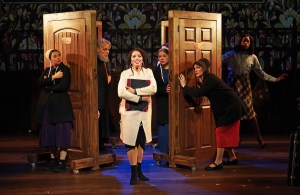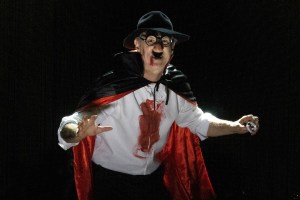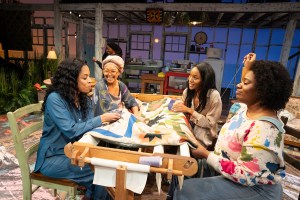Review: Welcome to the Big Dipper Offers a Musical Blizzard of Social Issues
The new show makes its world premiere with the York Theatre Company.

(© Carol Rosegg)
There are two blizzards in Welcome to the Big Dipper, one literal, the other metaphorical. The events in Jimmy Roberts, Catherine Filloux, and John Daggett’s new musical (inspired by Filloux’s play All Dressed Up and Nowhere to Go), making its world premiere with the York Theatre Company, hinge on a winter storm forcing its large cast of characters together under one roof. But the show itself is also a flurry of musical styles, plot threads, and social issues. As with most blizzards, the result is an unwieldy mess, though not without enjoyable moments.
The Big Dipper of the title is the name of an inn in the (fictional) small town of Bigelow, just south of Niagara Falls in New York. Its owner, Joan Wilkes (Debra Walton), is on the verge of selling it to a real-estate developer to help pay for her son Dez’s (Christian Magby) college education. Thanks to a blizzard, however, the Big Dipper Inn is forced to shelter two groups of people involved in a crash nearby. One is a group of Amish folk, including widowed father Amos King (Robert Cuccioli) and his daughter Rebecca (Mia Pinero), on their way back home from Ontario. The other is a group of drag queens — including Jacky/Jake Barnes (Michael Yeshion), Latrice/Larry (usually played by this production’s director, DeMone Seraphin, but played by Darius Harper at the performance I attended), and Vanessa/Arnold (Pablo Torres), all led by their choreographer, Carly (Jayae Riley Jr.) — on their way to a conference/talent show in Toronto.
Tensions abound, though less between the two disparate cultures than within them. Rebecca not only is still mourning the loss of her mother, but is also harboring doubts about her own faith. She also isn’t too thrilled about being forced to marry Eli (also Torres), thereby making her open to the love-at-first-sight romantic overtures of Dez. Romantic complications also bedevil Carly, a transgender woman who pines for Jacky, who is afraid of his wife finding out about his love of dressing up in women’s clothing. Jacky is also a lawyer, as is Bonnie Haskins (Jennifer Byrne), who works for the real-estate developer trying to snatch the Big Dipper Inn. Amos’s own grief over his late wife finds a parallel with a trauma in Joan’s past. And then there’s the role the inn’s permanent resident, Mr. Sapper (also Seraphin/Harper), plays in the building’s fate.

(© Carol Rosegg)
Religious doubt, closeted sexuality, even America’s shameful history of slavery (in a deus ex machina climax that’s bold, to say the least). There hasn’t been such a pile-up of social issues in one musical since Jagged Little Pill‘s brief Broadway run back in 2019. Alas, Welcome to the Big Dipper suffers from similar deficiencies as that Alanis Morissette-inspired after-school special: It’s too busy touching on hot-button topics without seeming to really understand them.
The lives of the Amish, for instance, are basically reduced to gags about how they hired a Mennonite to drive them and how they don’t know how to use computers. And though the trans and cross-dresser characters are handled with more sensitivity, their superficial characterizations here don’t always escape the feel of well-meaning liberals merely congratulating themselves on their inclusion without doing the tougher work of more fully imagining these queer characters’ inner lives.

(© Carol Rosegg)
Still, Welcome to the Big Dipper appears to have been conceived as basically a feel-good entertainment, and on that level, it works. Roberts’s lightly jazzy music is as pleasant as you’d expect from the composer of the long-running smash off-Broadway hit I Love You, You’re Perfect, Now Change, given an extra bloom in Doug Katsaros’s four-piece orchestrations. His lyrics also match Filloux and Daggett’s book in earnestness (Daggett is also credited with additional lyrics).
Brian Pacelli’s scenic and projection design especially contribute a convincingly homey feel to director Seraphin’s production, especially in its changing backgrounds to denote settings as varied as the Big Dipper Inn’s wooded interiors and the snowy wide-open exteriors of both small-town New York and Niagara Falls itself.
Most of all, there is the amiable cast’s energy and impressive pipes. Both Walton and Cuccioli bring genuine gravitas to individual numbers in which their characters reflect on their familial tragedies. Byrne takes her scheming lawyer character right to the edge of delicious mustache-twirling villainy in “Go With What Ya Got.” Pinero and Magby exude touching innocence and desire in their scenes together, while Riley’s firm belief in herself as Carly contrasts vividly with Yeshion’s anxiety as Jacky. Welcome to the Big Dipper may overreach in its broad scope, but its isolated pleasures and committed performances dictate that you may come away from it feeling uplifted anyway.









